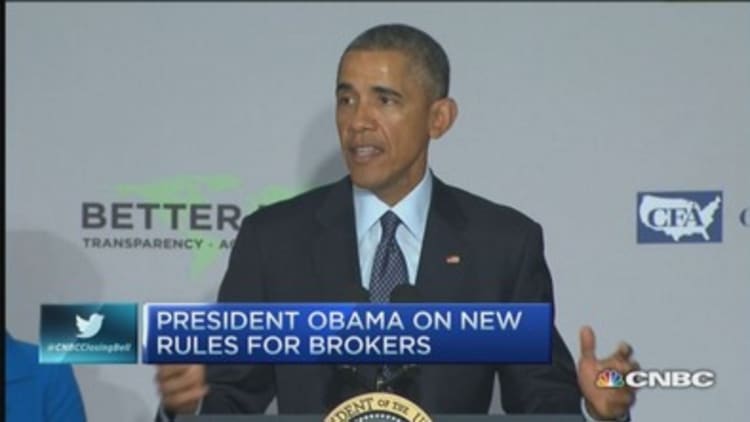
Advice abounds when you are putting money into a 401(k). Your employer urges you to save, and may even automatically enroll you in a plan or match your contributions.
But when you prepare to retire, or take another job, that changes. You have the option to roll your 401(k) into an IRA, and not every financial professional offering advice about that is required to act entirely in your best interest. Investment advisors are required to follow that principle, known as the fiduciary standard. But brokers are only required to recommend "suitable" investments.
The difference between "fiduciary standard" and "suitable" seems arcane. But it means a broker can advise you to put money in a high-cost or low-performing fund or account, even when a better option is available, as long the recommendation is suitable. The recommendation does not have to be in your absolute best interest. According to a leaked White House memo, first obtained by The Hill in January, studies showed that difference wound up costing investors between $8 billion and $17 billion annually in high fees or sub-optimal investment performance.
"When you get bad advice, you are paying for it," said Cristina Martin Firvida, director of financial security at AARP.
New proposal on the way
But on Monday, President Barack Obama directed the Labor Department to proceed with new rules that would rein in conflicts of interests among Wall Street brokers who advise clients on retirement investments.
Read MoreObama presses new rule for broker retirement advice
AARP is among the groups pushing for the changes. But the financial services industry and the Chamber of Commerce are up in arms. For example, the Securities Industry and Financial Markets Association, or SIFMA, has argued vehemently against the proposal and helped beat back an earlier version of the proposal that the Labor Department proposed in 2010. The Chamber of Commerce has shared its concerns, as well.
Brokers and the associations representing them argue that adhering to the tougher fiduciary standard would prove so costly that small investors would not be able to afford investment advice at all.
Under the new rules, an investor might not be able just to pay a broker a commission for a trade, but instead would likely pay a fee based on assets under management, said Lisa Bleier, managing director of SIFMA. She added that the scenario would be more expensive for small investors.
"The laws are constantly improving when there are concerns that are raised. Currently FINRA and the SEC are overseeing the retail market very well," Bleier said.
'Wild West' for IRAs
The Labor Department proposal is taking shape as public discussions about retirement savings are heading in a new direction. For decades, policymakers, employers and financial institutions have focused on encouraging employees to put money away in defined contribution plans such as 401(k)s. But now, experts are realizing that when people retire and depend on their 401(k) assets for their retirement security, they need more impartial guidance than the current system automatically provides.
"IRAs are essentially a Wild West. Anything goes," said David Laibson, an economics professor who has studied the effects of cognitive changes on financial decision-making ability. "The vast majority of American households don't know enough about the asset management industry to make sophisticated choices in the IRA market. They are ripe for ripoffs, and that gets more likely as they age."
The case for keeping a 401(k)
Firvida, director of financial security at AARP, pointed out that in some cases it may make more sense for 401(k) account holders to simply leave their money in the 401(k) when they retire or change jobs. A plan may or may not offer the best investment options for retirees. As an example, target date funds for a retiree's time horizon may not be an option. On the flip side, a 401(k) plan may offer attractive investment choices, and there are fiduciary standards that apply to 401(k) plans.
"There is definitely a sentiment among some in the Department of Labor that, at least for some employees, it would be better to leave the money in the plan," said Pamela O'Rourke, senior vice president and senior counsel at Integrated Retirement Initiatives. "Once it comes out of the plan, individuals are often on their own."
Read MoreRollover rethink
AARP's Firvida voiced confidence that the rules will change. "I think ultimately, conflicts of interest are going to be eliminated," she said. "I really do believe people saving for their retirement will end up with advice that is in their best interest because it's common sense."
The shape and form of the new proposal are still unclear. But with assets in IRA and 401(k) accounts at roughly $14 trillion, the retirement market is an important part of the financial services industry. The fight over how to work with these investors is far from over.
—Reuters contributed to this report.






